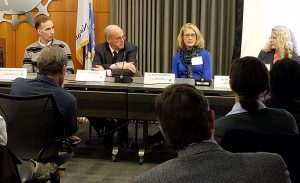The LTER Network Office (LNO) facilitates both internal and external communications for the LTER Network. With over 2000 scientists working on questions that range from coral resilience to the role of fire in carbon storage, no single office could provide an exhaustive catalog of LTER science. Rather, the LNO aims to raise the profile of the Network as a whole and illuminate the role that LTER sites play in integrating short-term studies with long-term observations, serving as magnets for collaboration and education, and providing context and expertise for stakeholders and the scientific community.
Communication-related activities of the LNO:
Web site. The LNO hosts and maintains the LTER web site, the LTER Intranet, the LTER photo gallery, and a Network events calendar. Please contact webmaster@lternet.edu to update information or to discuss ideas for new stories or features.
Newsletter
- LTER Network News, issued monthly, provides brief, accessible summaries of recent science from across the Network as well as regular organizational updates. It is designed to inform LTER network scientists and staff, as well as partners, educators, and the broader ecological community. Please share and encourage your colleagues to subscribe.
Media relations.
- NSF Science Communications Officer Cheryl Dybas works directly with LTER investigators and their university news offices to develop and distribute news releases on major publications. Please contact Cheryl, or ask your press office to do so, as soon as you know a paper has been accepted for publication. Adequate lead time is critical for distributing press releases while the media is still interested.
- The LTER Network Office gathers and shares information that is less time-sensitive, including post-release publications, education and outreach activities, LTER presence at scientific meetings, and synthesis working group activities.
Science spotlights. By writing stories, creating maps, videos and data visualizations, the LNO helps make the scientific discoveries of the LTER Network accessible to resource managers, decision makers, educators, and reporters seeking background. Whether working with researchers and outreach managers at individual sites to spotlight a recent finding or explaining the importance of a new synthesis emerging from a working group, we aim for clear, accurate, engaging and visually compelling communication.
Social media. The LNO has an active social media presence at @USLTER on Twitter and USLTER on YouTube. Like or follow us for the latest news on what’s happening at other sites, as well as resources in science communications, synthetic ecology, and open data.
Also follow and contribute to the LTER_Community Instagram feed.
Mailing lists. The LNO maintains email discussion lists and archives records of LTER Network committees.
Communications training and resources. Looking for some professional development or just putting together a brownbag on blogging, video, or social media? We have a set of communications resources and offering occasional training opportunities online, at meetings, and at the All-Scientists’ Meeting. If you don’t yet see what you’re looking for, don’t hesitate to connect the LTER Network Office Director, Marty Downs.











